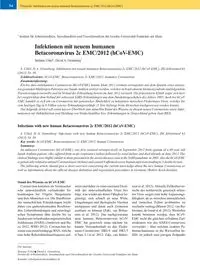
2013 Infektionen mit neuem humanen Betacoronavirus 2c EMC_2012 (hCoV-EMC) PDF
Preview 2013 Infektionen mit neuem humanen Betacoronavirus 2c EMC_2012 (hCoV-EMC)
1 Institut für Arbeitsmedizin, Sozialmedizin und Umweltmedizin der Goethe-Universität Frankfurt am Main Infektionen mit neuem humanen Betacoronavirus 2c EMC/2012 (hCoV-EMC) Stefanie Uibel1, David A. Groneberg1 S. Uibel, D. A. Groneberg: Infektionen mit neuem humanen Betacoronavirus 2c EMC/2012 (hCoV-EMC). Zbl Arbeitsmed 63 (2013) 54–56 Schlüsselwörter: hCoV-EMC, Betacoronavirus 2c EMC/2012, humanes Coronavirus Zusammenfassung: Ein bis dato unbekanntes Coronavirus (hCoV-EMC) konnte Ende 2012 erstmals retrospektiv aus dem Sputum eines ansons- ten gesunden 60jährigen Patienten aus Saudi-Arabien isoliert werden, welcher sich mit akutem Atemnotsyndrom und folgendem Nierenversagen vorstellte und im Verlauf der Erkrankung bereits im Juni 2012 verstarb. Die präsentierte Klinik zeigte sich hier- bei vergleichbar dem Verlauf der schweren SARS-Erkrankungen aus dem Pandemiegeschehen des Jahres 2003. Auch bei hCoV- EMC handelt es sich um ein Coronavirus mit genetischer Ähnlichkeit zu bekannten tierischen Fledermaus-Viren, welches bis zum heutigen Tag in 9 Fällen ernster Erkrankungsverläufe (5 Tote bislang) beim Menschen nachgewiesen werden konnte. Der folgende Artikel soll einen kurzen Überblick zum aktuellen Stand des Wissens zu diesem neuen Coronavirus sowie Infor- mationen zur Falldefinition und Meldung von Verdachtsfällen bzw. Erkrankungen in Deutschland geben (laut RKI). Infections with new human Betacoronavirus 2c EMC/2012 (hCoV-EMC) S. Uibel, D. A. Groneberg: Infections with new human Betacoronavirus 2c EMC/2012 (hCoV-EMC). Zbl Arbeitsmed 63 (2013) 54–56 Key words: hCoV-EMC, Betacoronavirus 2c EMC/2012, human Coronavirus Summary: An unknown Coronavirus (hCoV-EMC) was first isolated retrospectively in September 2012 from sputum of a 60 year old Saudi Arabian patient, who suffered from acute respiratory failure followed by renal failure and died already in June 2012. The clinical findings were highly similar to those presented in the severe diseases seen in the SARS pandemic in 2003. Also the hCoV-EMC is genetically related to animal Coronaviruses (in bats) and caused 9 affirmed severe human infections leading to 5 deaths by now. The following article should give a short overview concerning the current knowledge about the new human Coronavirus as well as information about the official disease definition and registration procedures in Germany (Robert Koch-Institut). Die Autoren: Stefanie Uibel ■ David A. Groneberg Institut für Arbeitsmedizin, Sozialmedizin und Umweltmedizin der Goethe-Universität Frankfurt am Main Kontakt:
